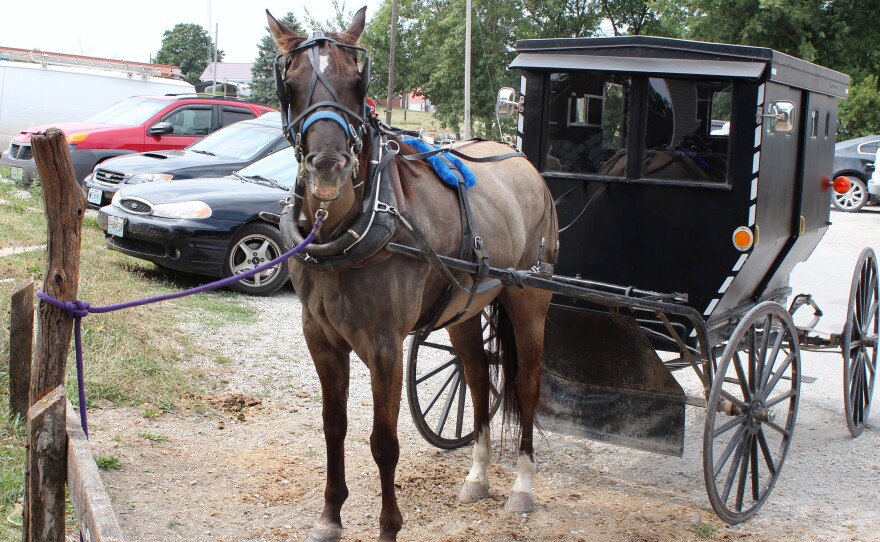Most Americans don’t eat horse meat, and they don’t like the idea of horses being slaughtered, but a handful of investors are struggling to restart a horse slaughter industry in the United States.
They argue that slaughter would be good for the horse business, and more humane than the current situation. The issue cleaves horse owners into two camps: one that views horses as pets, and another that see them as livestock.
People in some Asian and European countries eat horse meat routinely, and thousands of American horses are already slaughtered for those markets each year. But they’re not slaughtered here — not anymore.
Cynthia McPherson led efforts to kill two proposed horse slaughterhouses in southern Missouri. To her, it would be like slaughtering pets.
“If you said, 'I’m going to open a puppy mill to breed dogs because people in China and people in France want to eat dog meat,' I think there’d be a big public outcry,” says McPherson. “And that’s what we have here.”
Public outcry has followed horse slaughter since Congress funded inspections for it a couple of years ago. U.S. Humane Society President Wayne Pacelle, argues that horses suffer more than other animals at slaughter, and he contends that the meat is dangerous since horses can be treated with drugs not allowed in animals raised specifically for food.
“We have standards," Pacellle says. "We have values in society. You don’t just opportunistically harvest whatever animal is around."
But Sue Wallis, a Wyoming lawmaker with a dozen horses, says fattening up animals fast, and slaughtering them young, is the modern way to produce meat. Horse slaughter, she says, follows an older model.
“Chickens for eggs, lambs for wool, cows for milk, horses for work, and when their useful productive life has passed, then you turn them into meat,” says Wallis.
For Wallis horses as livestock first, companions second. They are more assets, than pets.
“I love horses, I really love horses," says Elmer Beechy, an Amish man who runs Jamesport Harness Supplies and Carriages in Jamesport, Mo.
“But, when they’re no good to me, what are you going to do with them? We don’t want to take them out back and shoot them, " he says. " May just as well be slaughtered, and get some use out of them."
Slaughter produces meat for horse-eaters, and money for horse owners. Until they were shut down domestic slaughter houses provided a ready market for old, hobbled, or unruly steeds. It made horses more valuable. Beechy says shutting it down has spurred a glut of unwanted, and neglected animals.
“There’s a lot of horses out there in the pasture, hurting. Some of them linger 3 or 4 years, suffer every day. And the slaughter’s the best place for them,” says Beechy.
Beechy is talking about domestic slaughter. Long hauls to slaughter plants in Canada and Mexico can brutalize the animals, and burn up the seller’s profit. So, thousands of horses have just been abandoned on Indian reservations, cow pastures and public lands.
“People will just stop and open the trailer, and open the trailer and drive off," says Jim Smith, who runs a trail ride business and maintains a wild horse refuge in the Missouri Ozarks, where, he says “drop offs” are a serious problem.
“Well, they want rid of them, and there ain’t nowhere to go with them, they can’t get nobody to take them, and they can’t sell them, I mean they won’t bring nothing,” says Smith.
As far as Smith is concerned, the solution lies in opening what he calls “killer plants”, like the one Dave Rains is trying to start near Gallatin, Mo.
It is a necessary business, says Rains, but not work he’s looking forward to.
“It’s hard, but it’s a lot better than slow painful death, and that’s what a lot of horses are going through right now,” says Rains.
Rain’s finances are suffering too. He built this plant on the corner of his farm to process naturally-raised beef and pork. When big companies saturated that marketplace, he put in for a permit to butcher horses. He expected to be in business, this time last year.
“Well, I knew there’d be some opposition, but I never dreamed it would be at the level that it has been,” says Rains.
A lawsuit, backed by the Humane Society, now stands between Rains and a state permit. A plant in New Mexico is also embroiled in litigation.
Meantime, Rains has picked up work driving a school bus, to help make ends meet, and keep his own saddle horses fed, while he waits to find out whether or not horses will once again be slaughtered in the United States.
CENTRAL STANDARD INTERVIEW with Sue Wallis, US Chairman of the International Equine Business Association and Wayne A. Pacelle, President and Chief Executive Officer of the Humane Society of the United States:






